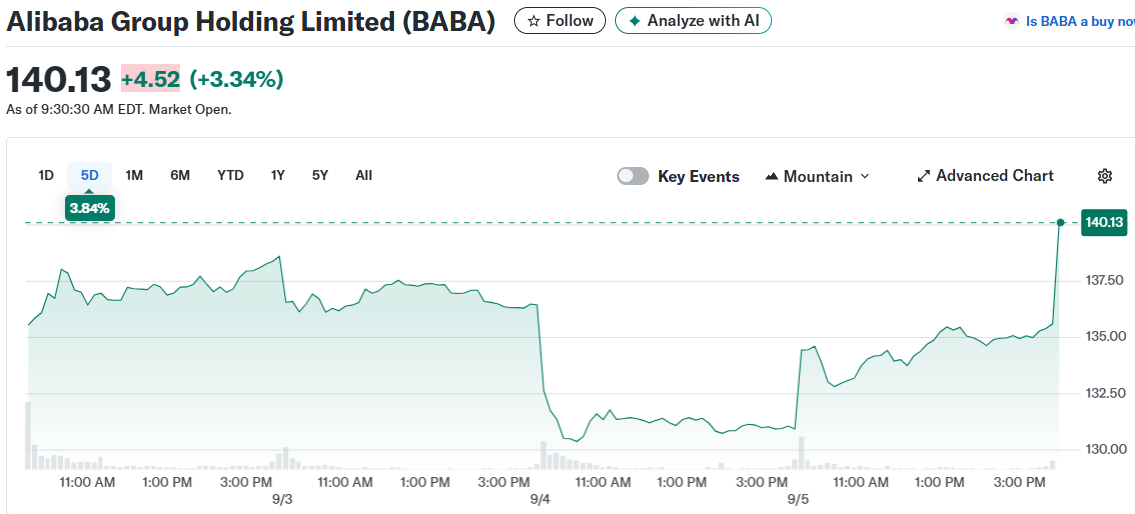TLDR
- Alibaba stock jumped 4% in Hong Kong after unveiling trillion-parameter Qwen3-Max-Preview AI model
- Cloud division revenue surged 26% year-over-year with AI products growing triple-digits for eight consecutive quarters
- Company developing proprietary AI processor to reduce dependence on U.S. Nvidia chips
- E-commerce business remains weak despite 25% increase in Taobao app monthly active users
- Stock still trades at less than half its 2020 peak of over $300 per share
Alibaba shares climbed 4% to HK$138.0 in Hong Kong trading Monday following the release of its most powerful AI model yet. The Chinese e-commerce giant unveiled Qwen3-Max-Preview, featuring over one trillion parameters.

This marks Alibaba’s largest AI advancement to date. The model outperforms the company’s previous Qwen3-235B offering and directly challenges industry leaders OpenAI and Google DeepMind.
The timing proves strategic as AI competition intensifies globally. Major tech companies are racing to develop more sophisticated models, with Alibaba positioning itself as a serious contender.
Cloud Business Drives Strong Performance
Alibaba’s cloud division delivered impressive results in the June quarter. Revenue jumped 26% year-over-year, powered by soaring demand for AI infrastructure and services.
AI product revenue has now achieved triple-digit growth for eight straight quarters. This consistent performance demonstrates the sustainability of Alibaba’s AI strategy.
The cloud segment sits at the core of the company’s AI ambitions. Management has steadily invested in this area while open-sourcing multiple advanced models throughout 2025.
These investments are generating returns. The cloud business helped offset weakness in other parts of Alibaba’s portfolio during recent quarters.
Chip Independence Strategy Takes Shape
Alibaba is developing a proprietary AI processor to reduce reliance on U.S.-made Nvidia chips. This initiative comes as Beijing increases scrutiny of foreign-made semiconductors.
Geopolitical tensions have made chip access a strategic priority. U.S. export restrictions create uncertainty around semiconductor availability for Chinese tech companies.
The company joins other domestic tech giants pursuing chip alternatives. This trend has accelerated as trade tensions between Washington and Beijing persist.
For Alibaba, achieving chip independence could prove crucial for its AI roadmap. Access to advanced processors remains essential for training large-scale AI models.
E-commerce Challenges Continue
Despite AI progress, Alibaba’s core e-commerce business faces headwinds. Overall revenue grew just 2% in the June quarter, though this improved to 10% after adjusting for business disposals.
Domestic consumption remains sluggish in China. High youth unemployment and weak consumer confidence continue weighing on retail spending patterns.
Competition from Pinduoduo and Douyin has intensified. These platforms capture market share through aggressive pricing and innovative shopping formats.
Alibaba responded with quick commerce initiatives like Taobao Instant Delivery. However, these efforts remain unprofitable while requiring heavy investment.
The company did report positive user engagement metrics. Monthly active consumers on the Taobao app increased 25% during the first three weeks of August.
Management restructured operations by combining major platforms into one unified commerce division. This aims to reduce duplication and improve competitive positioning.
Alibaba currently trades with a market cap around $303 billion. The stock remains well below its 2020 peak above $300 per share, reflecting years of regulatory pressure and competitive challenges.
The latest AI model release and strong cloud performance suggest the company is making progress in its transformation efforts.





